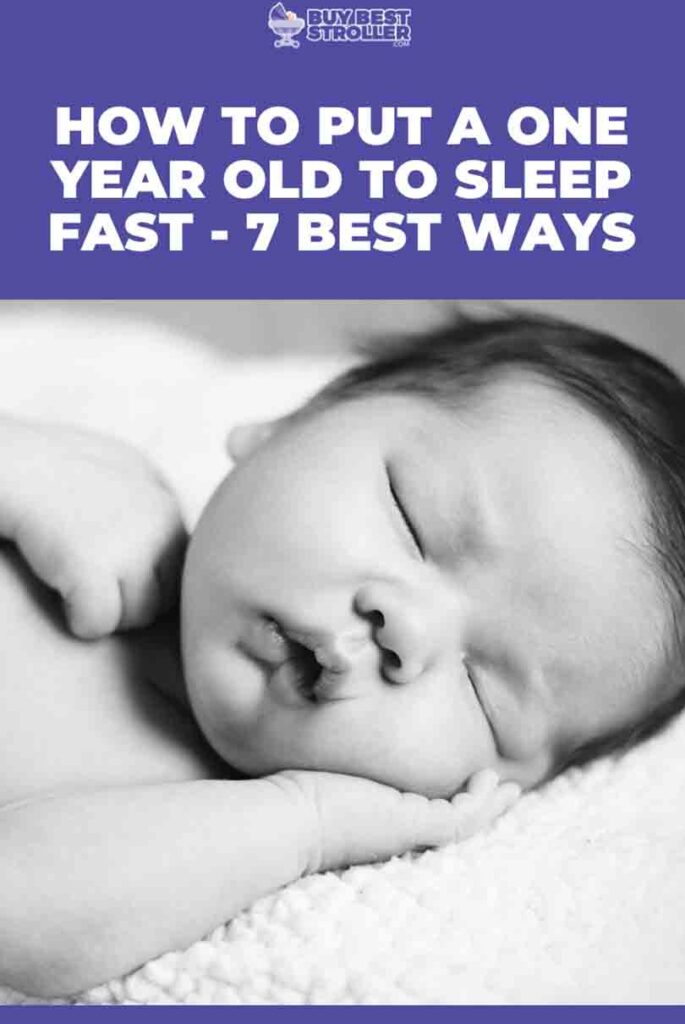Are you wondering how to put a one year old to sleep fast? Well, there’s no doubt that bedtime with a baby can be stressful for everyone involved, but you don’t have to let it be that way. As a mother, I’ve experienced plenty of stressful nights trying to get my baby to sleep. On some nights, it is difficult to calm down her.
Getting to sleep and staying asleep are the two most important parts of getting a good night’s sleep. Generally, if children are getting enough sleep, they will wake up by themselves in the morning. Sleep is a learned behavior. There are many people who believe that if someone is tired enough, they will fall asleep naturally. But that isn’t true.
Now I’m going to talk about some gentler methods to help your one-year-old fall asleep faster.
How To Put A One Year Old To Sleep Fast
1. Set Up A Bedtime Routine
Although it may not seem like it can make much of a difference, you’ll find out it is indeed one of the most effective strategies. You’d be amazed at how powerful this method is and how quickly your child can fall asleep.
In a recent study, researchers found that a routine of warm baths, massages, and quiet activities (lullaby, prayers, books, etc.) helped improve the sleep of babies whose parents described them as having sleep problems.
There was a significant amount of change in just three nights. In this study, the only variable was starting the bedtime routine; no sleep training was involved. As a result, babies began falling asleep faster, waking up less often and for a shorter time when they did wake up, and sleeping longer in general.
If you follow the same bedtime routine each night for your baby, you give them the predictability they need to be able to relax and sleep.
2. Create A Good Sleep Environment
You should make sure your child’s room promotes sleep. The best thing to do is to keep it quiet, dark, and cool.
It’s perfectly acceptable for some children (especially the very young) to have a nightlight or dim light in their room.
To create a rhythmic, steady sound that will help them sleep or to drown out the sounds coming from the rest of the house, use a noise machine or a fan.
3. No Electronic Gadgets Before Bedtime
You should remove their televisions, computers, games, and other electronic devices from their rooms. Using stimulating contents as well as light-emitting devices can induce wakefulness by mimicking daylight and tricking the brain to believe it has to stay awake. At least an hour before bedtime, electronics should be turned off or taken away.
4. Check Noise And Light In Your Baby’s Bedroom
Make sure your child’s bedroom is not too bright or noisy for them to sleep in. TVs, computers, smartphones, and tablets emit blue light, which suppresses melatonin levels and delays sleep. Early evening bright light can also cause drowsiness in young children.
5. Feed Them Enough
You should ensure your baby eats a proper meal at a reasonable time in the evening. If your child feels hungry or too full before bed, he or she may be more alert or uncomfortable.
If this happens, your child may have difficulty falling asleep. Providing a healthy breakfast in the morning helps to set the child’s body clock at the right time.
6. Holding Your Baby As You Fall Asleep
Remember that providing your baby with a safe sleep is important. Dr. Ahmann says that exhausted parents often fall asleep holding their babies and wake up hours later to find them in a dangerous position. Whenever you’re tired, put your baby back to sleep in the crib. Babies do not die if they cry from their crib.”
7. Avoid Caffeine Before Bedtime
In any case, caffeine is a stimulant not recommended for children. You can allow your child the occasional soft drink, but make sure they don’t consume sugary and caffeinated drinks within three hours of bedtime.
It is fine to have a snack before bed as long as it is healthy and not too filling. You can offer them a warm glass of milk or a light snack like fruit or crackers before going to sleep.
8. Keep Regular Sleep And Wake Times
You should keep your child’s bedtime and wake-up time within 1-2 hours of each other each day. By doing so, your child’s body clock will remain regular.
As you can see, I’ve gathered eight tips to help your one-year-old baby find sleep bliss. By following these tips, your toddler will no longer have trouble falling asleep. A year old is my favorite age for my baby. As my toddler learns to walk, communicate, and become more independent, it melts my mama’s heart.
Baby sleep is usually disrupted between 6-12 months of age due to development, teething, and more but you’re past that now. Having a child turn one year old does not mean the problems with sleep disappear. As a matter of fact, they can persist for quite a while unless you actively teach your one year old how to sleep well.
Consult your baby’s pediatrician if you suspect that your child may have a sleep disorder, or make an appointment with a sleep specialist.




